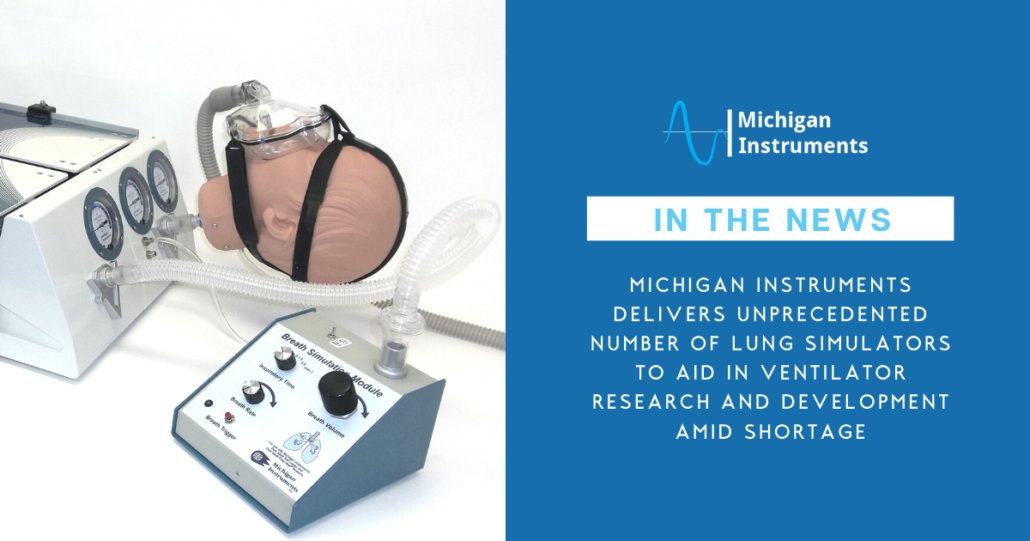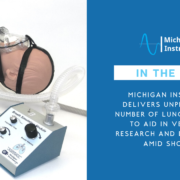
Michigan Instruments, a leading manufacturer in Lung Simulation, has delivered an unprecedented number of lung simulators to organizations around the world to help in respiratory technology research and critical ventilator development and manufacturing to combat the shortages caused by the COVID-19 pandemic.
Many countries, including the United States, are continuing to see a rise in COVID-19 cases, which brings to light the extreme lack of medical resources like ventilators available to hospitals and critical care facilities.
In response, the world has seen an incredible response in the development and manufacturing of ventilators as researchers attempt to create a cost-effective and efficient lifesaving solution. Michigan Instruments has been at the forefront of this response by working with organizations to deliver Lung Simulators designed for validating and testing these ventilators.
Organizations like NASA, Ford Motor Company, Cornell University, Michigan Technological University, University of California San Diego, OperationAir, and the Royal Women’s Hospital, Monash University and the Alfred Hospital in Australia have all used Michigan Instruments lung simulators to aid in the development and discovery of several potential ventilator solutions.
- A group of engineers from NASA’s Jet Propulsion Laboratory have developed a high-pressure ventilator that can mechanically breathe for patients with the most severe cases of COVID-19.
- Students and faculty from Cornell University, Michigan Technological University, and the University of California San Diego have all developed versions of effective, low-cost ventilator systems created using inexpensive materials or materials readily available.
- OperationAir has also developed a prototype called the AIRone, an easily producible emergency ventilator that can be used when shortages occur due to the pandemic. Production has already started on the device and its design is open source and available globally.
- A team of researchers from the Royal Women’s Hospital, Monash University and Alfred Hospital have successfully tested, in a simulated environment, the potential to ventilate two lungs of different compliances from a single ventilator using only commonly available hospital equipment.
These lung simulators provide developers with cutting edge technology that can aid in the design, engineering, testing and manufacturing of devices like ventilators by replicating hundreds of healthy and diseased lung conditions to evaluate a ventilator’s performance with accurate measurement and data reporting.
Based in Grand Rapids, Michigan, Michigan Instruments continues to produce and ship Lung Simulators. The increased demand in production allowed Michigan Instruments to utilize qualified workers from other manufacturers forced to close during the Michigan shut down, as well as existing employees working extended hours.
Chris Blanker, President & Owner of Michigan Instruments shared, “In a time when many manufacturers were forced to lay off employees and slow production, we were blessed to be able to remain open, provide work for our employees and utilize very talented workers from local companies forced to close. Sadly, this is due to the Pandemic, but our team is proud to know that our devices are helping with the development and supporting the production of ventilators and other devices that help save lives.”The ventilator’s modularity, that it can function as a transport or an ICU ventilator, running with a desktop or laptop, is one of the key innovations of Ivy’s design. By running multiple instances of the clinician software, a single tablet or computer can govern multiple ventilators remotely, so nurses can monitor many patients without having to enter their rooms.
Chris Blanker shared, “We are very proud to have been able to quickly ramp up production and delivery of our lung simulators for the organizations that are developing and manufacturing critical ventilators and other devices to help save lives. The production ramp up was challenging, but our team rose to the task. We’ve worked closely with developers and manufacturers of all backgrounds and we look forward to continued partnerships like this. ”




